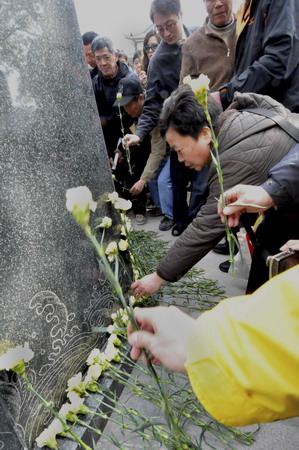-
News >Bizchina
Wasted space in cemeteries inspires newmini-burials
2011-03-28 15:09
Shanghai - The idea of a partial sea burial, in which most of a person's ashes are sprinkled at sea while a small amount is put in a tiny box and buried in a cemetery, was introduced in Shanghai on Saturday.
People mourn their loved ones at Binhaiguyuan Cemetery in Fengxian district, Shanghai on Saturday. [Photo / Xinhua]
The concept is aimed at ensuring less space is used in city graveyards.
The first three families to choose a partial sea burial scattered about 99.5 percent of their loved ones' ashes in the ocean during the annual public memorial for sea burials, which took place at Binhaiguyuan Cemetery in Fengxian district, Shanghai on Saturday.
The memorial garden contains a monument carrying the names of almost 2,000 people whose entire ashes have been scattered at sea.
"We introduced the partial sea burial as a new concept, also a mid-point between traditional burials and sea burials," said Zhao Xiaohu, the manager of Binhaiguyuan Cemetery. "We keep a small amount of ash in a container as large as a matchbox that will decompose in the ground along with the ash after being buried."
Zhao added that he and his team at the memorial garden, which was established in 2004 for families choosing burials at sea, will recommend partial sea burials to families because of the environmental benefits.
According to statistics from the Shanghai Feisi Sea Burial Company - the only authorized sea burial company in China - the annual increase in the number of sea burials is about 10 percent. About 1.5 percent of the city's burials are at sea.
Two decades ago only 0.2 percent of Shanghai residents were buried at sea. The practice started to take off in the metropolis in 1991, when the ashes of 287 people were scattered at sea. The number had risen to 2,100 by 2010.
"Despite the rise in the number of people accepting sea burials, we would still like to see more people choose this environmentally friendly method," said Zheng Jixiong from the Shanghai Feisi Sea Burial Company.
"Residents' awareness and acceptance of sea burials have increased significantly during the past two decades."
During the past 20 years, the city has organized 162 collective sea burial ceremonies, scattering more than 21,100 caskets of ashes.
"I would like to be buried at sea because I don't want the next generation to waste too much energy on organizing my funeral and on tomb sweeping every year. They can remember me in their hearts," said Hu Pei, a resident in her 50s.
But, while about 80 percent of Shanghai residents are cremated, only a very small number of them choose to have their ashes scattered at sea, despite it being the cheapest option.
"The city has simply run out of large, open spaces for cemeteries," said Zhao. "If we keep allowing individual plots to take up 1.5 square meters there will be no land left in less than 10 years."
The country's growing population has made its land increasingly precious, especially in large and medium-sized cities. At least 20 million graves are dug nationwide each year, occupying about 67 square kilometers."Land is becoming so scarce that if we don't make the cemeteries more efficient soon, there will be no space left and everyone will have to scatter their ashes into the ocean," said Zhao.
Zhao said sea burials save land and pointed out that the monument carved with up to 2,000 names only occupies 0.3 sq m, which is one-fifth of the size of a normal burial plot.
Shanghai's municipal authorities are encouraging residents to pick sea burials by offering subsidies.
According to Shanghai's municipal civil affairs bureau, the city began subsidizing sea burials in 2003, when applicants could receive 150 yuan ($23) toward the cost. Since last year, those sprinkling ashes at sea get between 2,000 and 3,000 yuan in subsidies.
"It's difficult to change people's minds in a short period of time so we have to find more effective ways of improving public awareness about environmentally friendly burials like sea burials and the newly introduced partial sea burials helps," said Zheng.
"Most people want their ancestors to be buried in a big cemetery," he said. "But we hope our recent efforts will encourage at least some of them to change their minds."
